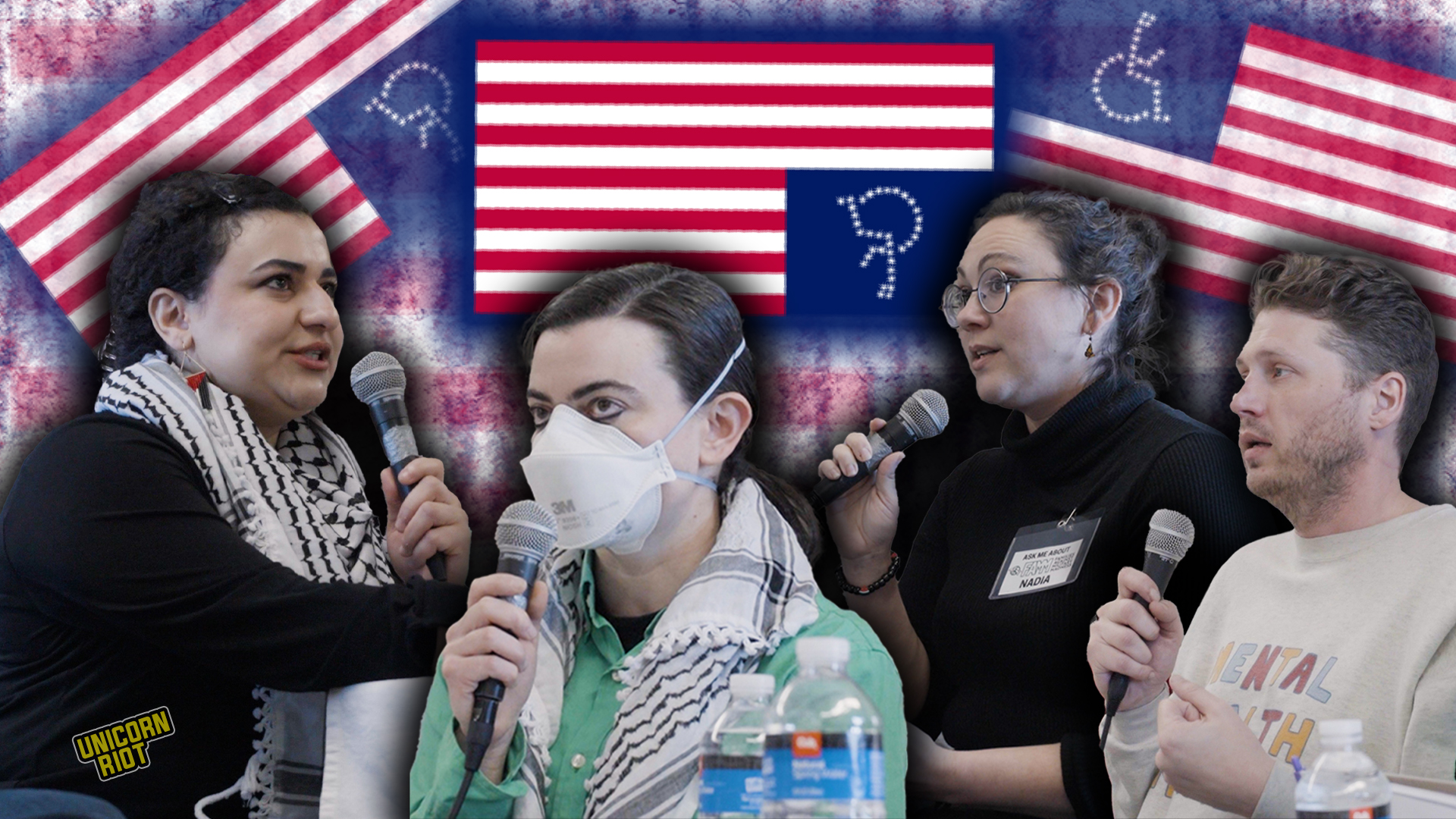Access is Love and ‘Disability Justice is Liberation’
Minneapolis, MN — On July 26, 1990, the world’s first civil rights law for people with disabilities, the Americans with Disabilities Act (ADA) was signed into law in the U.S. July is now dubbed Disability Pride Month to commemorate the ADA. Thirty five years after the act became law, four disability rights activists spoke in South Minneapolis about the need for actual disability justice, more protections, awareness, resources, and more accessibility.
“Disability justice emphasizes that access is fundamental,” said Nadia Haar, a panelist and member of the disabled community during a discussion titled Disability Justice is Liberation.
The morning panel event in late February at the Lucy Parsons Center started with a youth doing a Braille readout. The panel featured Haar, organizers with Healthcare Workers For Palestine Twin Cities (HCW4P), professor Dr. Sam Sharp and psychiatrist Sulwa Nubani, along with disability rights activist and videographer Aaron Johnson.
Each panelist answered questions centered around disability rights, healthcare, and access — see the video below for some of these answers. The event was organized by HCW4P and Families Against Military Madness (FAMM). Dozens of people were in attendance with childcare provided in the next room.
Accounting for the range of disabilities from cognitive, physical, and sensory and the varying extent to which disability is defined by different public health data sources, it’s estimated that 13% of the civilian noninstitutionalized population and upwards of at least 28% of adults in the United States live with some form of disability.
During the panel, Aaron Johnson shared his experience of having a COVID-induced stroke that left him physically disabled, having to relearn how to walk. He spoke about difficulties that disabled people face with accessing resources, “there is nothing in place.”
Despite his own consulting work with the state, Johnson struggled to gain access to resources or help. Johnson asked “What are you in a capitalist society if you don’t have a body or mind to generate revenue … how are you viewed if you’re not contributing toward the GDP?”
Johnson was unable to access disability benefits for fours years of dire need, and it was only “pandemic unemployment assistance” that helped him secure housing. “In a system that’s designed to eliminate expenses, if you’re living on health care … you’re on the chopping block. Like you, the individual, the person.”
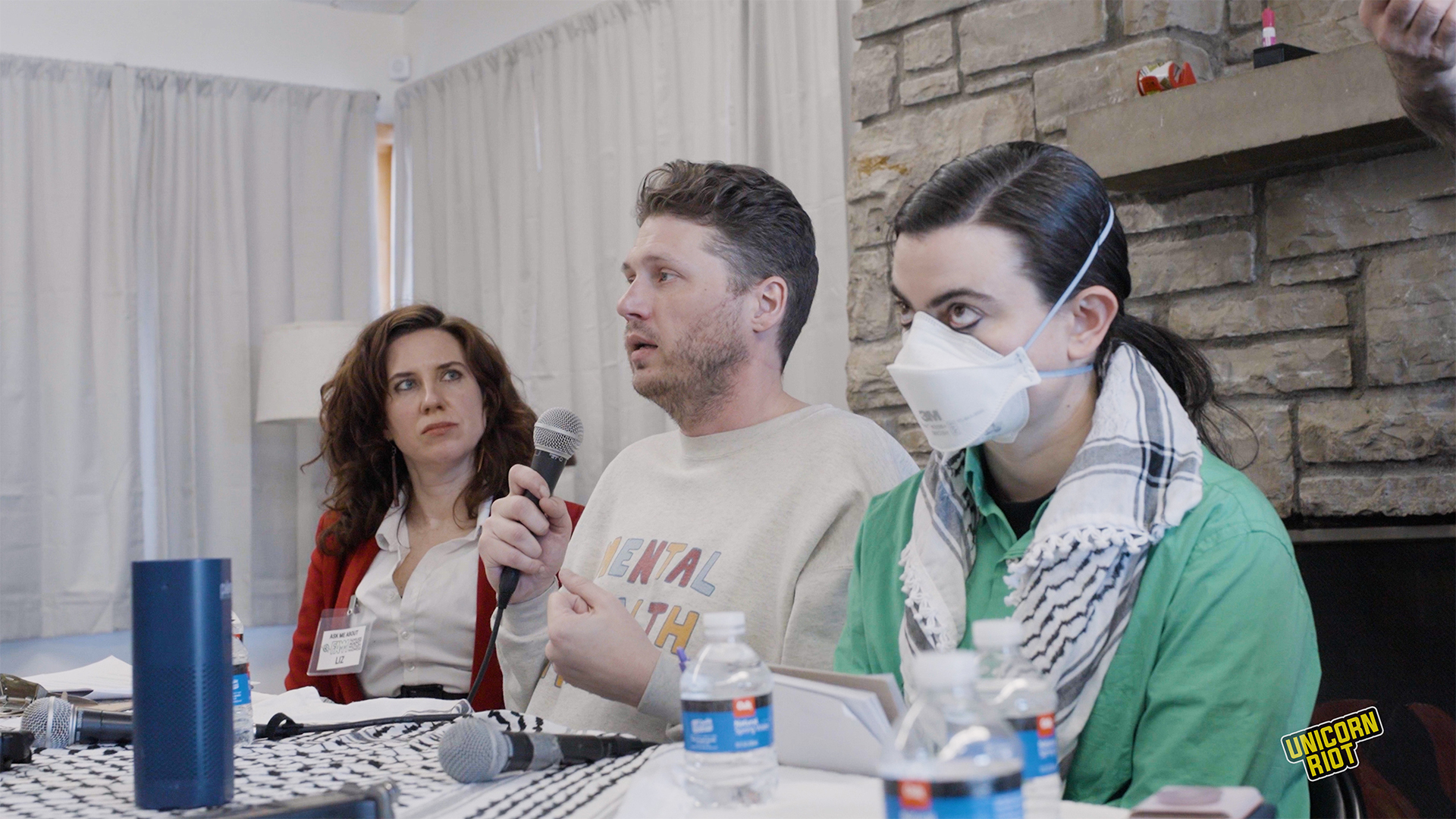
“Health and healthcare are inherently social justice issues,” said Dr. Sam Sharp, a mental health worker with HCW4P, “systems are designed to be invisible … to go unchallenged” and “disabled people are often dehumanized.”
Modern healthcare is “shaped by eugenics and white supremacy,” and what comes from this history is a xenophobic and white supremacist viewpoint “that some people’s bodies and lives are fundamentally inferior,” Dr. Sharp said. “We see this with disabled people, with people of color and with intersex people. There’s this thought that those bodies are inherently pathological and this definition of health isn’t made for them.”
Once people become aware of how the systems work, it helps “to meet specific needs that disabled people have” and move away “from seeing disability as something that’s an individual deficit and treating disabled people with pity and, a sense of othering that can be really damaging,” said Dr. Sharp.
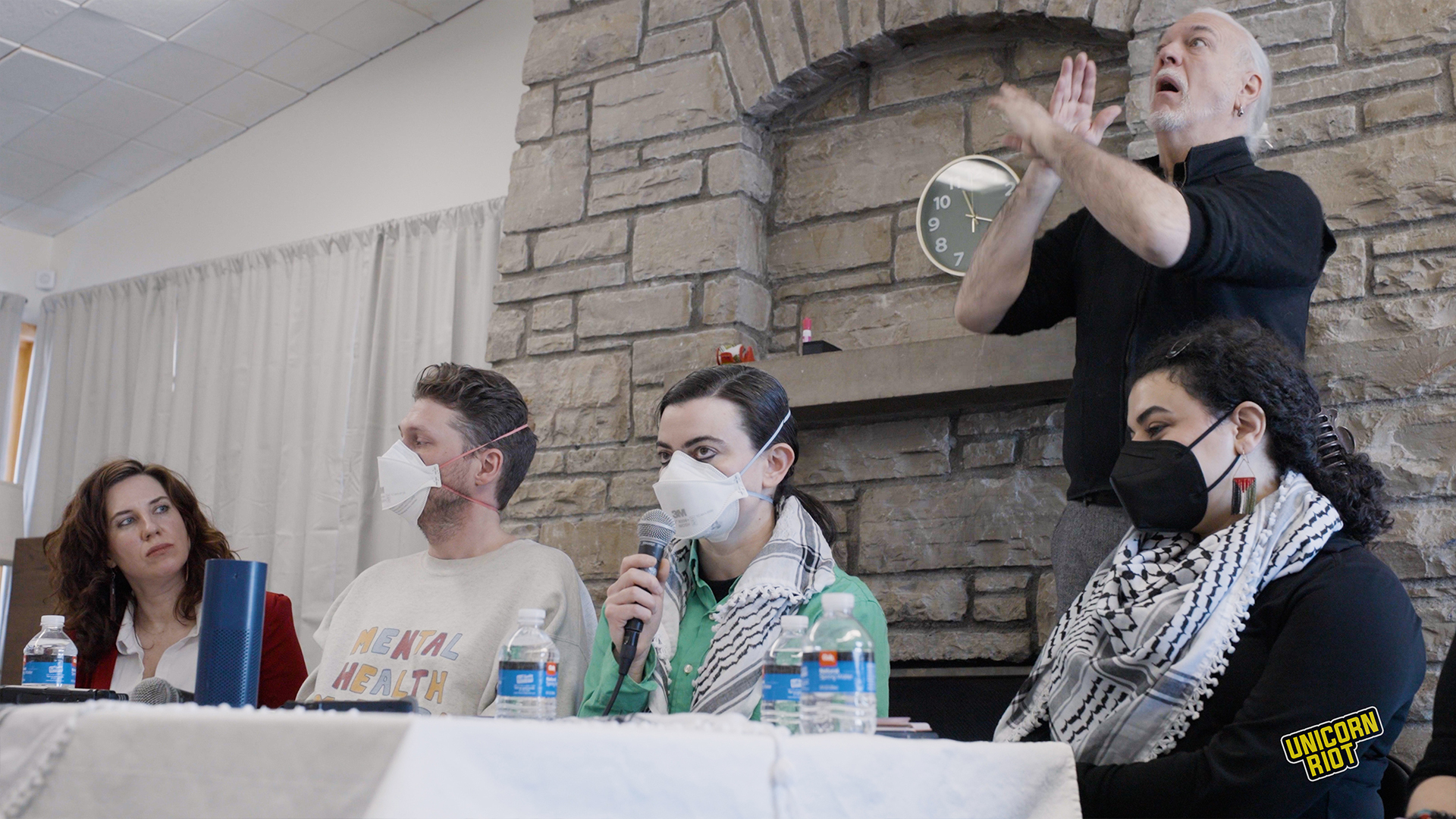
The goal in a just society, according to panelists, is to give everyone the ability to access the same environments, information and products. However, accessibility can be limited, whether purposefully or not.
“When we build a world that prioritizes access, we create safety,” said Nadia Haar, and “when safety exists, healing becomes possible.”
“Access is love. Safety is dignity. Healing is justice. And these three are inseparable,” said Nadia Haar.
“Healing happens when the society shifts from treating accessibility as a burden to seeing it as love in action. When healing happens, disabled people and all of us can envision and create a future rooted in justice, care, and liberation.”
Nadia Haar
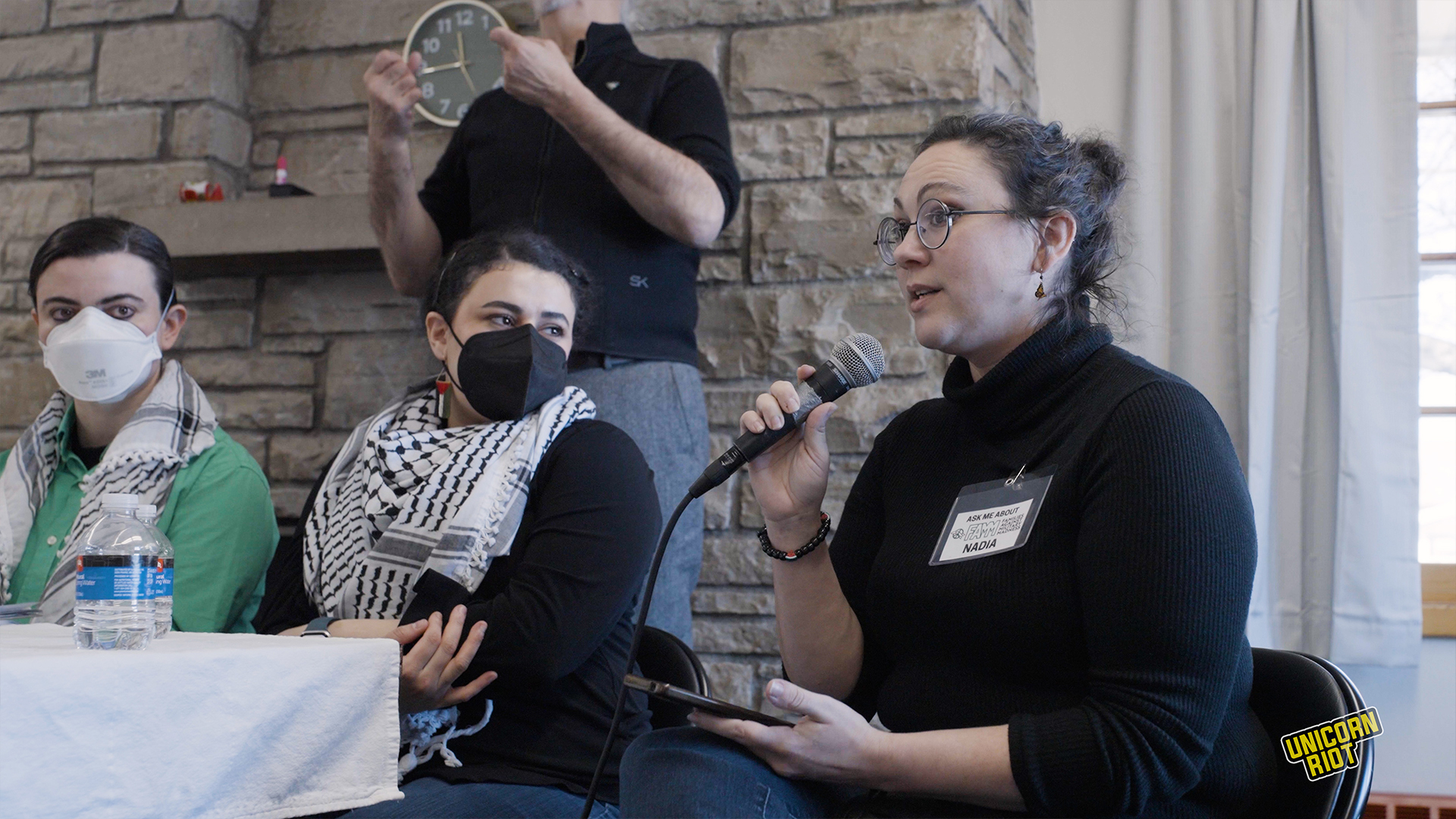
Genocide is Disabling: Gaza Focused on During Disability Justice Panel
Both HCW4P organizers, Dr. Sam Sharp and Sulwa Nubani, referenced the ongoing genocide of Palestinians by Israel during the discussion. “We’re focusing on being sick from genocide because … we as a community have become sick from genocide,” said Nubani, a Palestinian-American psychiatry physician who also organizes with Doctors Against Genocide.
Growing up in Palestine with a giving and loving culture with a “collective approach,” Nubani said the word “mutual aid” wasn’t in her lexicon until she came to the U.S. “Growing up in Palestine,” she said, when she ran out of sugar, she could go “knock on my neighbor’s door and get sugar.”
Nubani went on to say that accessibility is “such an odd thing” because “the systems we put in place makes it that we have to even come up with the word accessibility rather than it be a natural construct.”
“If somebody was at a bus stop and could not get onto a bus … The bus is going to be late … men and women will stop there, carry the individual, carry their supplies and put them on that bus. You bet that bus is not going to leave without them. So we will find a way. And the way we find that is through community.”
Nubani said community is the answer: “the thing is about colonialism and fascism and imperial world is to individualize you actually almost to a sickeningly pathological level, because then you focus on the you and not the US, the complete antithesis and the complete opposite of colonialist, colonial ideas is community.”
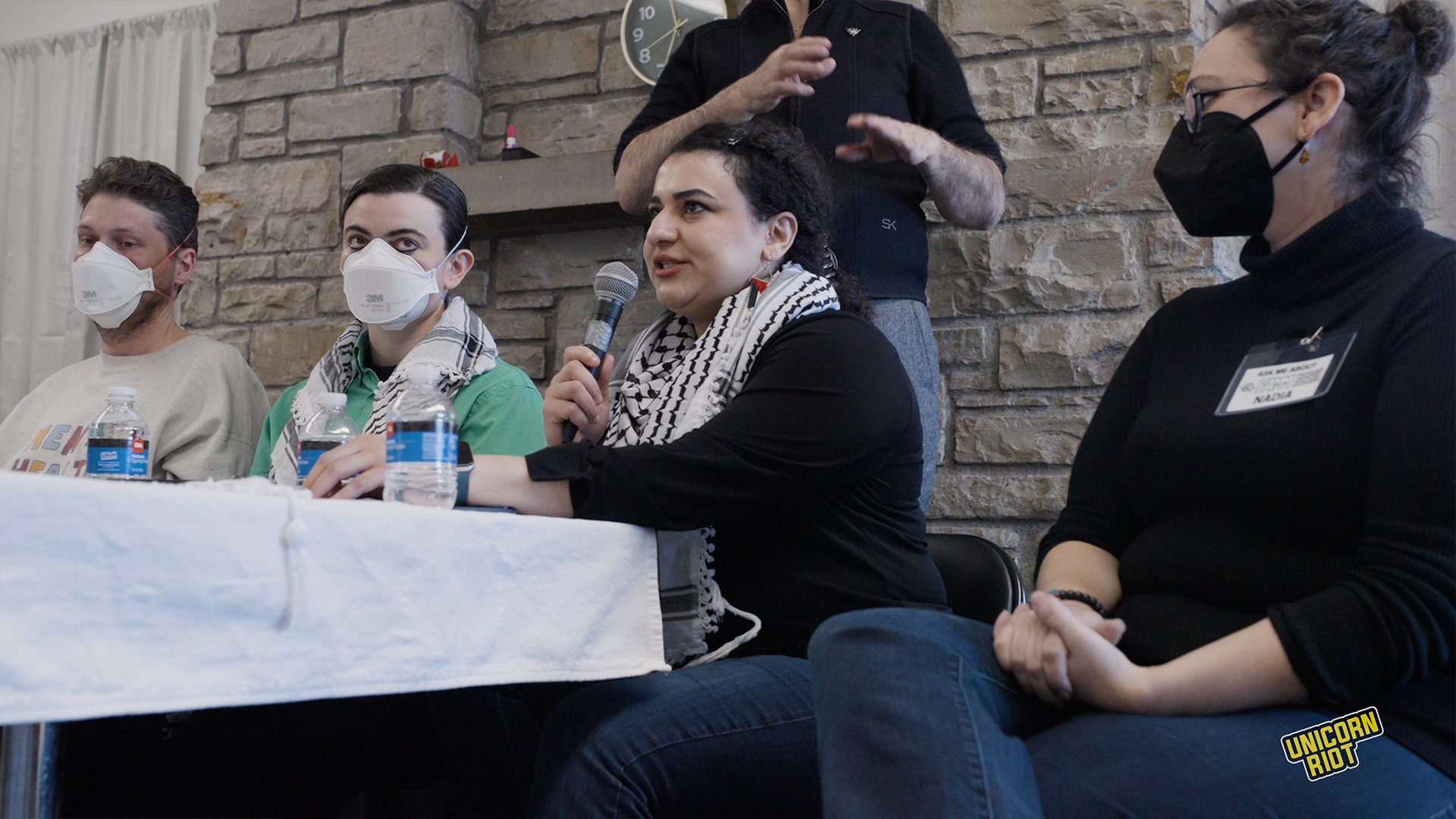
Palestinians in their homeland face extreme disabling forces. Israeli soldiers controlling their colonial projects in Gaza and the occupied West Bank disable society in a multitude of ways, including intentional destruction of healthcare infrastructure and anything that supports it.
Nubani said Israeli soldiers specifically aim their sniper rifles and weapons at Palestinians to shot them to maim, cripple, and handicap them, including shooting men in the groin.
She said that beyond visibly obvious disabilities, genocide disables generations. When a community survives genocide, that “lives in our nervous system.” Generational trauma “lives in every part of your body. You can’t separate it. You can’t separate experience.”
Dr. Sharp recalled that “one of the starkest examples” of health and healthcare being “inherently social justice issues” was hearing from healthcare workers in Gaza. Among the struggles they recounted, those who’ve traveled there on medical missions have shared with Sharp that there was “no soap in the hospitals,” making efforts to prevent infection and other complications extremely difficult.
“There are so many types of atrocities that many of us have seen and heard about, but that one sticks with me because it’s such a basic thing that’s has not been permitted to exist in a hospital setting by the logic of this project of genocide that’s being enacted in Gaza.”
“Disability justice is about healing from oppression,” said Haar, “healing from the trauma of systemic ableism, racism, and capitalism.”
For more information on disability rights in Minnesota, visit the Disability Justice Resource Center, an online resource dedicated to protecting the rights of people with developmental disabilities. The state also has the Disability Hub MN, a site and call line made in attempts to help people “navigate the system” and provide answers to questions. For more resources for intellectual and development disabilities, you can start with The Arc Minnesota.
Follow us on X (aka Twitter), Facebook, YouTube, Vimeo, Instagram, Mastodon, Threads, BlueSky and Patreon.
Please consider a tax-deductible donation to help sustain our horizontally-organized, non-profit media organization:

